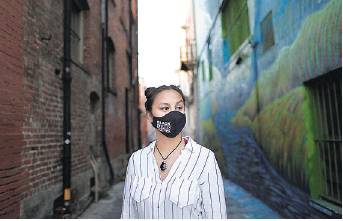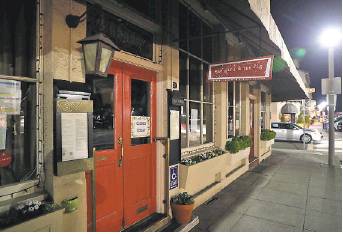Restaurants can pay high price for ignoring employees’ values
By Janelle Bitker
Like restaurants everywhere, Sonoma’s celebrated the Girl & the Fig restaurant has struggled due to the coronavirus pandemic over the past year, navigating temporary closures and reopenings as regulations changed. Wine Country wildfires last year added to the uncertainty for the usually thriving business.
But when it decided to shut its doors this week, neither health hazards nor climate change was to blame. Instead, a dispute over a server’s desire to support the Black Lives Matter movement by wearing a BLM face mask has gone viral and led to charges of racism. The former server said she felt pressured to quit over her support of a civil rights issue. The restaurant’s owner said it was about maintaining a uniform look for an upscale vibe. Now, both are receiving death threats, and some have threatened to burn the restaurant down.
It’s the latest blowup in a series of clashes over workplace dress codes, and whether political or social justice messaging should be allowed or encouraged. Some companies, such as Starbucks and Taco Bell, quickly reversed their bans on Black Lives Matter attire, while others, like Whole Foods, stood by their decision to prohibit logos and slogans. Often, the dispute involves a debate over whether Black Lives Matter is a political or human rights movement.
Those companies, though, are national chains. For independent restaurants like the Girl & the Fig, grappling with how to handle the issue can be critical to their survival, experts say. A younger generation of diners prefers to know the values of the businesses they patronize, with many saying that staying apolitical is a statement in itself. And with the downturn in sales due to the pandemic, any negative attention can be enough to sink a restaurant.
“With younger, more inclusive and more diverse groups coming into leadership and vocalizing their opinions and their stances on issues, it’s only going to grow stronger,” said Shaun Fletcher, a public relations professor with San Jose State University. “The younger generation, they’re not bound by the politics and the business parameters that older generations have been bound by.”
Almost since it opened in 1997, the Girl & the Fig has been a Wine Country destination, beloved for its French-influenced cuisine using local ingredients. Its owner, Sondra Bernstein, is widely respected in the Bay Area restaurant industry. The restaurant became a hotspot for celebrities like Lady Gaga and New York Times writers who found a charming and, in many ways, old-school restaurant where service is paramount and duck confit is almost always on the menu.
The restaurant’s uniform look for staff — a crisp white shirt and green apron — has long been part of the employee handbook. With the advent of the coronavirus pandemic, and the added impact of wildfire smoke, face masks became standard, but the restaurant’s roughly 50 employees were allowed to wear masks they chose.
Kimi Stout, 34, began working as a server at the restaurant in early 2020, and in the summer after the death of George Floyd, she started wearing masks inscribed with “Black Lives Matter.” Stout, who identifies as part Asian, Mexican and queer, is a former Miss Sonoma County, longtime restaurant worker and current sales associate. She said she chose the masks because she wanted to show her support for the movement.
The controversial saga started in August, after her mask drew a hostile complaint from a customer. Her manager suggested she not wear it for her personal safety; she declined and continued wearing the masks. Three weeks later, on Sept. 1, the Girl & the Fig unveiled a new face mask policy, requiring staff to wear plain surgical masks or masks with the restaurant’s brand. Coowner John Toulze says the new mask policy had been in the works for a while, an extension of its existing dress code after servers wore neon-colored masks or ones that didn’t cover their nose. But Stout says she felt personally targeted, and after declining to adhere to the new policy, felt pressured to quit. On Feb. 4, she went public with her story on Instagram, leading to a viral report by SFGate. (The San Francisco Chronicle and SFGate are both owned by Hearst but operate independently of one another.)
The backlash was swift. The Girl & the Fig shut down its Instagram account, and its Yelp and TripAdvisor pages became flooded with one-star reviews calling the owners racist. Its phone lines keep ringing, emails keep coming in, with threats to burn down the Sonoma restaurant’s building. The company has alerted local police and temporarily closed the restaurant, along with its cozy Glen Ellen offshoot the Fig Cafe & Winebar, out of an abundance of caution.
Stout and her supporters called on the Girl & the Fig to support Black organizations, something the restaurant historically hasn’t done. Toulze called it a blind spot. The restaurant donates to nonprofits focused on local seniors, Latinos and the queer community — a combination Toulze says reflects the demographics of Sonoma County, a region that’s 62% white, 27% Latino and 2% Black.
Last summer, during the height of the Black Lives Matter protests, Toulze said there weren’t as many protests or as much visible support compared to cities like San Francisco and Oakland.
“We were insulated from the greater Black Lives Matter conversation because it wasn’t a part of our community in the way I think it is in other parts of the Bay Area,” Toulze said. “We weren’t really dealing with it to be frank, and maybe that’s the problem.”
Stout is feeling overwhelmed by the online attention, both positive and negative. On one end of the spectrum, she is a hero, exposing the hypocrisy of a beloved restaurant that claims to be inclusive. On the other side, people paint a picture of an entitled liberal, just trying to get attention. On Thursday, she says she also started receiving death threats on social media.
“A lot of those types of people who are criticizing me are the people who have granddaughters and daughters that participate in the Miss America program,” Stout said. “Maybe I’m not just someone seeking attention. I’ve actually done things in the community.”
Many longtime customers have reached out to the Girl & the Fig, saying they’ll come back to the restaurant when it reopens — but plenty of others are saying they won’t ever return.
“At some point you start going, am I really a bad person? I don’t know,” Toulze said. “When people are constantly telling you how horrible you are, it’s hard not to start feeling it.”
For independent restaurants, the topic of a uniform may seem straightforward, but as public opinion shifts, managers need to be flexible when issues like this arise. Engaging with employees on their values is now smart business practice, and ultimately, Toulze failed to see the bigger picture, according to Fletcher, the public relations professor.
“It came across as disingenuous and somewhat callous in order to maintain his standing with the consumer base that’s largely white,” he said. “I don’t think he fully understood how strong the (Black Lives Matter) movement was — it’s much stronger than a policy that he set.”
During a politically divisive time, Fletcher said owners need to read the environment and understand that anyone speaking out about injustice can go viral on social media in minutes, attaching a stigma to the restaurant that can be hard to shake. By appearing to bow to customers who might complain about a Black Lives Matter mask, the Girl & the Fig alienated those who support marginalized communities. Whether that was the intention doesn’t ultimately matter, Fletcher said.
Toulze doesn’t know when he’ll reopen the restaurants, but he’s talking to employees about ways to move forward. The company will require diversity and inclusion training for all staff and ownership, and it has pledged to contribute to an organization that calls on major retailers to stock 15% of their shelves with products from Black-owned businesses.
The face mask policy will remain in place, however, though Toulze is exploring other options to allow employees to express themselves while still in uniform, perhaps by wearing buttons.
While Stout says she doesn’t feel every single restaurant needs to take a stand on issues like Black Lives Matter, she’d prefer it if businesses were more transparent about their values.
“I no longer believe in being quiet about your political stance out of respect,” she said. “The people who prefer to keep politics out of it are the ones who don’t vote for my best interests as a brown, queer, female person.”
Janelle Bitker is a San Francisco Chronicle staff writer. Email: janelle.bitker@sfchronicle.com Twitter: @janellebitker

